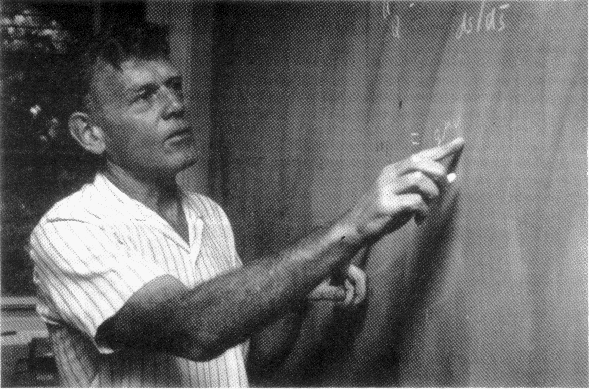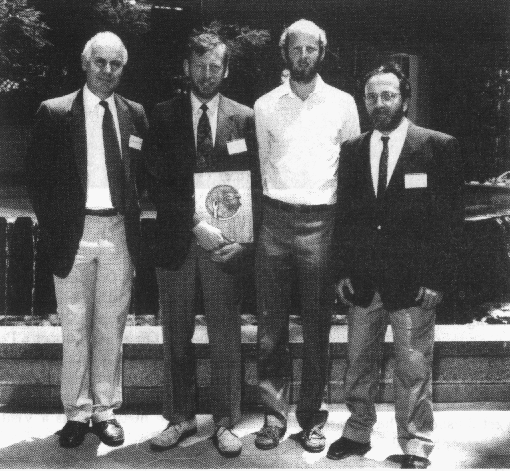

1993 was the final year of the first triennium of funding for the RCfTA. Following a review conducted during the year, funding for a second triennium was approved.
In the first triennium of the RCfTA a cohesive research team was built up and contacts and collaborations with observational groups, primarily in the Sydney area, were established. The research team has a wide range of astrophysical interests, and a few research highlights are discussed below. From the Director's viewpoint, particularly pleasing features of the achievements in 1993 include (1) the high publication rate during the year, (2) the success of the workshops, and particularly of the Harley Wood Winter School, organized by RCfTA Fellows, and (3) the high standard of our students' oral presentations, notably at the Annual General Meeting of the Astronomical Society of Australia, which can be attributed in large part to the experience gained in the Journal Club.
There were several changes in personnel during the year. New appointments were: Dr Simon Johnston, as a Research Fellow from August 1993; Dr Jessica Chapman, as a Research Fellow (part time) from October 1993 until March 1994; Dr Whayne Padden, as a Post-Doctoral Fellow from June 1993 until March 1994; Dr Peter Edmonds, as a Post-Doctoral Fellow from October 1993 until March 1994; and Dr Qinghuan Luo, as a Post-Doctoral Fellow from June 1993 for six months. Particularly notable was the appointment of Professor Colin Norman (Johns Hopkins University and the Space Telescope Science Institute), as a Visiting Professor in the RCfTA. Two research staff left the RCfTA in 1993: Dr John Brett resigned in June 1993 to take up an appointment at the Materials Research Laboratory of the Defence Science and Technology Organization in Melbourne, and Dr Jianke Li resigned in October 1993 to take up an appointment at the High Altitude Observatory in Boulder, Colorado. Also, our Administrative Assistant, Mrs Barbara Dunn retired in March 1993 but continued on a casual basis until December 1993. Barbara was replaced by Ms Ann Fox, who started as Administrative Assistant on 17 January 1994. Ann will bring a number of skills to the RCfTA, particularly in the area of publicity and layout.
It is pleasing to record that Simon Johnston was part of a team, led by Dr Dick Manchester of the Australia Telescope National Facility, to be awarded one of the four CSIRO Medals for 1993 for their work that led to the discovery of some intriguing new pulsars. In §6.3 below there is a description of a specific project, led by Simon, concerning one of these pulsars.
A long-term objective of the RCfTA is to build up Australian theoretical astrophysics in a way which supports and complements Australian observational astronomy. This objective requires that at least some of the RCfTA researchers attain permanent positions in Australia which will enable them to continue their theoretical research and their collaborations with observers. It is therefore considered important to offer those who aspire to academic appointments an opportunity to gain teaching experience. An agreement has been negotiated with the School of Physics to make several teaching positions available to staff with research appointments. The arrangement is that the School co-opts the researcher for a semester, paying their salary for that period. Three RCfTA Research Fellows will be co-opted to the teaching program in 1994. It is anticipated that this program will continue in future years, but the number of co-options may change from year to year depending on the needs and finances of the School.

Plans for the second triennium of the RCfTA include consolidating the research program by encouraging closer collaboration amongst the Fellows, and consolidating and strengthening the collaborations with observational astronomers. An emphasis will be given to fostering closer cooperation with other Australian theoretical astrophysicists. An important initial step in this direction is the setting up of a Joint International Visitor Program funded by the RCfTA and the newly created Australian National University Astrophysics Theory Centre. This program, which will begin in 1994, will initiate cooperation amongst theoretical astrophysicists on an Australia-wide basis in coordinating and selecting distinguished visitors. Although each visitor will have a primary host, it is expected that each will visit more than one of the theoretical astrophysics groups, to encourage and foster any overlapping research interests.
Following the recommendation of the Review Panel, an Advisory Board for the RCfTA has been set up, and had its first meeting in February 1994. At that meeting it was decided to invite a further member to join the Board. The members of the Board are: Dr Russell Cannon (Director of the Anglo-Australian Observatory), Professor Lawrence Cram, Professor John Davis, Professor Bob Delbourgo (University of Tasmania), Professor Ron Ekers (Director of the Australia Telescope National Facility), Professor Jeremey Mould (Director of Mount Stromlo and Siding Springs Observatories), Professor Joe Monaghan (Monash University), Professor Colin Norman (Space Telescope Science Institute and Johns Hopkins University), Dr Ray Protheroe (University of Adelaide), and Professor Dayal Wickramasinghe (Australian National University). At its first meeting the Board also discussed an updated statement of the Aims and Objectives of the RCfTA, as explained later in this report.
The postgraduate training program developed further in 1993. One PhD and one MSc were completed, and three new PhD programs were commenced. The Research Fellows have been involved both formally and informally in the supervision of graduate students, and also of Honours and vacation students. In the longer term, the vitality of the graduate program depends on the supply of interested and able students. With growing evidence of a fall off in undergraduate numbers in physics, it will be a challenge to the RCfTA to continue to attract suitable PhD candidates at the rate maintained over the past three years.